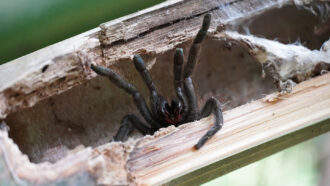
Meet “bambootula.” This newfound tarantula gets its nickname from the tall, stiff-shafted grass in which it makes a home in northern Thailand.
Taksinus bambus, as the spider is officially known, “is the world’s first tarantula with a biology tied to bamboo,” says arachnologist Narin Chomphuphuang of Khon Kaen University in Thailand.
Bamboo stems, or culms, give the tarantula ready-made burrows and nests. But T. bambus lacks the tools to bore into culms, so it relies on natural forces or animals such as borer beetles and rodents to create openings, Chomphuphuang and colleagues report January 4 in ZooKeys. Once inside, bambootula builds a silk “retreat tube” that keeps the spider secure and helps it move around easily.
Chomphuphuang was introduced to the tarantula by JoCho Sippawat, a popular wildlife YouTuber who discovered it when cutting bamboo in the forest near his home. Chomphuphuang’s team confirmed the spider belonged to a new genus and species based on the size and shape of its reproductive organs. It’s the first time in 104 years that anyone has turned up a new genus of tarantula in Asia, the researchers say.
Habitat type also was key to confirming the spider’s novelty, Chomphuphuang says. Other Asian tree-dwelling tarantulas are found in habitats unlike where bambootula showed up — a bamboo forest about 1,000 meters above sea level.
Cornell University arachnologist Linda Rayor isn’t too surprised by the find. So far, some 49,000 species of spiders are known to science and new ones are frequently discovered (SN: 2/4/16). Researchers estimate that 1 in every 3 to 5 spider species alive has yet to be found and named. Anyone can find a new spider, she says, including “local people looking and exploring and watching things.”
But “few people realize how much wildlife in Thailand is still undocumented,” Chomphuphuang says. Forests now cover only about one-third of the country. It’s important for scientists to keep looking for new species in such areas, he says, so the animals can be studied — and, where needed, protected.

 A new treatment could restore some mobility in people paralyzed by strokes
A new treatment could restore some mobility in people paralyzed by strokes  What has Perseverance found in two years on Mars?
What has Perseverance found in two years on Mars?  This robot automatically tucks its limbs to squeeze through spaces
This robot automatically tucks its limbs to squeeze through spaces  Greta Thunberg’s new book urges the world to take climate action now
Greta Thunberg’s new book urges the world to take climate action now  Glassy eyes may help young crustaceans hide from predators in plain sight
Glassy eyes may help young crustaceans hide from predators in plain sight  A chemical imbalance doesn’t explain depression. So what does?
A chemical imbalance doesn’t explain depression. So what does?